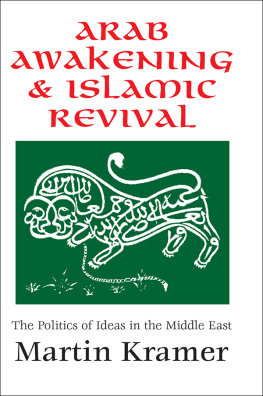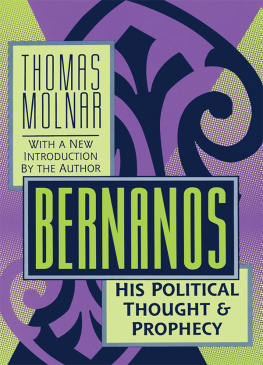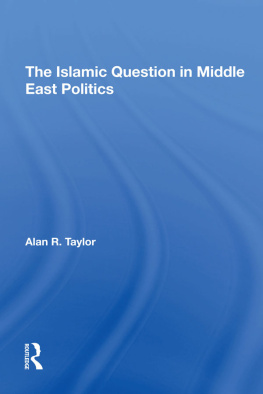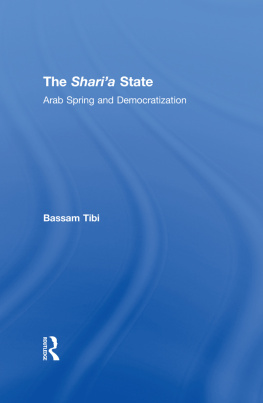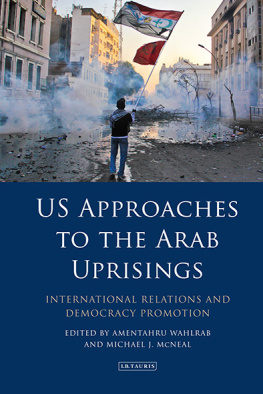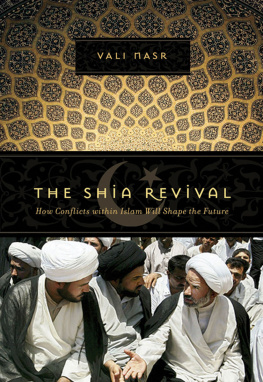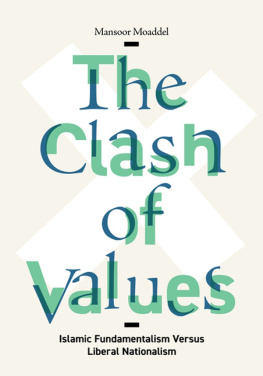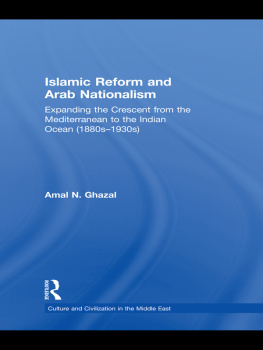First published 1996 by Transaction Publishers
Published 2017 by Routledge
2 Park Square, Milton Park, Abingdon, Oxon OX14 4RN
711 Third Avenue, New York, NY 10017, USA
Routledge is an imprint of the Taylor & Francis Group, an informa business
Copyright 1996 by Taylor & Francis
All rights reserved. No part of this book may be reprinted or reproduced or utilised in any form or by any electronic, mechanical, or other means, now known or hereafter invented, including photocopying and recording, or in any information storage or retrieval system, without permission in writing from the publishers.
Notice:
Product or corporate names may be trademarks or registered trademarks, and are used only for identification and explanation without intent to infringe
Library of Congress Catalog Number: 96-18312
Library of Congress Cataloging-in-Publication Data
Kramer, Martin S.
Arab awakening and Islamic revival : the politics of ideas in the Middle East
/ Martin Kramer.
p. cm.
Includes bibliographical references (p. ) and index.
ISBN 1-5600-272-7 (alk. paper)
1. NationalismArab countriesHistory. 2. Islam20th century.
3. Middle EastHistory20th century. I. Title.
DS63.6.K73 1996
320.5'4'09174924dc20
96-183123
CIP
ISBN 13: 978-1-4128-0767-8 (pbk)
ISBN 13: 978-1-56000-272-7 (hbk)
To Bernard Lewis
master, mentor, mensch
This volume brings together sixteen separate but closely related studies, bound together by an introduction and conclusion. in 1993. I am grateful to the publishers of the above for their kind permission to reprint.
I wrote nearly all of these studies at Tel Aviv Universitys Moshe Dayan Center for Middle Eastern and African Studies, which I now direct. I am indebted to the two past directors, Itamar Rabinovich and Asher Susser, for opening wide space for thinking, research, and writing. I owe another debt to Martin Indyk and Robert Satloff, the previous and present directors of the Washington Institute for Near East Policy, who encouraged my broader inquiries into the nature of Islamism. I gratefully acknowledge Irving Louis Horowitz of Transaction Publishers, whose suggestions helped to give this book its final form. My gratitude goes also to my parents, Anita and Alvin Kramer, in whose wooded retreat I prepared this book for publication. Finally, I embrace in thanks my wife Sandra and our children, who stoically bore my long absences as I pursued leads wherever they led.
Introduction
For the Middle East, the old appellation of the Ottoman Empirethe sick manstill seems apt. The social and political order in the Middle East seems as afflicted today as it appeared to observers a century ago, and many of the symptoms have not changed. Paul Kennedy, author of Preparing for the Twenty-First Century, has provided the kind of trenchant summation perhaps only a complete outsider can dare to offer:
Far from preparing for the twenty-first century, much of the Arab and Muslim world appears to have difficulty in coming to terms with the nineteenth century, with its composite legacy of secularization, democracy, laissez-faire economics, transnational industrial and commercial linkages, social change, and intellectual questioning. If one needed an example of the importance of cultural attitudes in explaining a societys response to change, contemporary Islam provides it.
Some historians and political scientists of the Middle East would recoil at this hint of cultural determinism, and most Arabs and Muslims would blame colonialism instead. But the Arab and Muslim worlds difficulty in coming to terms is undeniable.
This book is a critical assessment of two attempts to overcome that difficulty: Arab nationalism (or Arabism) and Islamic fundamentalism (or Islamism). Believers in each have tried to remake the modern Middle East into a seat of power and prosperity. So far they have failed, in many instances producing even more serious complications. While Arab nationalism seems finally to have been abandoned, Islamic fundamentalism remains the most widespread alternative to the resolute pragmatism of the new Middle East. Whether it will prevail is one of the great preoccupations of our own fin-de-sicle.
But this is not a future study. It is a book about modern history and contemporary politics, looking back over a troubled Arab century and a difficult Islamic decade. Like Europe, the Middle East has been buffeted by ideologies. Admittedly, their effects have not been as devastating in the Middle East; Europe paid for its nationalism with two terrible world wars, and then paid again for its communism with over forty years of threat and division. Ideology in Europe has had a greater capacity for destruction than ideology in the Middle East.
Yet if the failings of the Arab awakening and the Islamic revival seem smaller in comparison, this is largely thanks to restraints imposed by the West. It is usually argued that the oil extracted by foreigners, the military interventions made by foreigners, and the aid granted by foreigners have combined to make the Middle East dependent. But they may have also restrained a pursuit of utopias that could have pushed the Middle East over the edge long ago, into famines, gulags, and civil wars. As it is, parts of the region have been gutted or cleansed in the name of the Arab nation or Islam, from Kurdistan to Kuwait, from Lebanon to Sudan.
This is necessarily a book about illusion and disillusion, but even more, it is a series of studies in contradictions that finally became unsustainable. Arabism and Islamism purported to be authentic and original creations of Arabs and Muslims, but both owed much to foreign influences, romantic and radical. Both pretended to be liberating and unifying ideals, but their practice often produced oppression and division. Most of these contradictions have ended in a shattering of dreams, and sometimes of bodies. Each chapter picks up some discarded scrap of paper or shard of glass, and asks how the hope it represented came to nought.
The structure of this book is straightforward. An integrative chapter opens each of the books two partsone devoted to Arabism and the other to Islamism. Each integrative chapter is followed by seven more chapters on the particular origins or actual effects of Arabism or Islamism, in various times and places. This is not a seamless book of running narrative; its chapters are puzzle pieces, interlocking but separate. They can be assembled in more than one order, although the order suggested here seems the most logical to their author. The first part, on Arabism, revolves largely around personalities; the second, on Islamism, is structured around movements and events. The emphasis could easily have been reversed, but the sum would have been the same.
Awake, O Arabs, and arise!
The reign of ideology began with the spread of Arab nationalism. At the turn of the century, the Middle East was still largely the domain of the once-great empire of the Ottomans. It had been an empire defined by Islam but inhabited by peoples of many faiths and languages. Islamic tradition and local custom defined the relations between the empires diverse peoples. As Western influence grew, however, the ideas of national self-determination began to make inroadsfirst among the subject peoples in the Ottoman Balkans, later among non-Muslim minorities in the Asian heartland, and finally among Muslims themselves. Thus was born Arab nationalismthe idea that the far-flung speakers of Arabic constituted a distinct nation, entitled to independence from foreign Turkish rule. Its enthusiasts called this the

